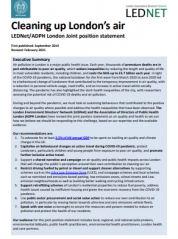In light of the Covid-19 pandemic, the national lockdown for the first wave from March 2020 to June 2020 led to a behavioural change of Londoners that contributed to the temporary improvement in air quality, with a reduction in personal vehicle usage, road traffic, and an increase in active travel whilst socially distancing. The pandemic has also highlighted the stark health inequalities of the city, with researchers assessing the potential links between Covid-19 deaths and air pollution.
The London Environment Directors’ Network (LEDNet) and the Association of Directors of Public Health London (ADPH London) published a joint position statement in September 2019 to set out how we should respond to this challenge, based on our expertise and the available evidence. Since the statement was published, we have experienced the COVID-19 pandemic and are living in the new norm, and therefore must look at sustaining behaviours that contributed to the positive changes to air quality where possible, and address the health inequalities that have been observed. LEDNet and ADPH London have revised the joint position statement, following the first wave of the pandemic.
Our recommendations are:
- To advocate for at least 2.5% of UK annual GDP to be spent on tackling air quality and climate change in the UK.
- Capitalise on behavioural changes on active travel during COVID-19 pandemic, protect Londoners, particularly children and young people from exposure to poor air quality, and promote further inclusive active travel.
- Support a shared narrative and campaign on air quality and public health impacts across London that will change the public’s perception around their own contribution to cleaning our air.
- Restrict driving fuelled by petrol or diesel and support cleaner alternatives by supporting schemes such as the Ultra Low Emission Zone (ULEZ), and scrappage schemes and local schemes such as restricted and emissions-based parking, low emissions zones, school streets and Low emission neighbourhoods as well as building better walking and cycling infrastructure.
- Support retrofitting schemes of London’s residential properties to reduce fuel poverty, address health issues caused by inefficient housing and green the economic recovery from the COVID-19 pandemic.
- Use public sector procurement and social value action to reduce our own contribution to air pollution, in particular by moving faster towards ultra-low and zero emissions vehicle fleets.
- Speak with one voice as boroughs to secure resources and powers needed to reduce air pollution
You can download the executive summary here.
You can download the full joint position on the left hand side of this page.

